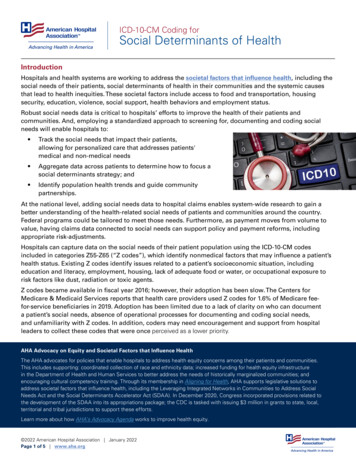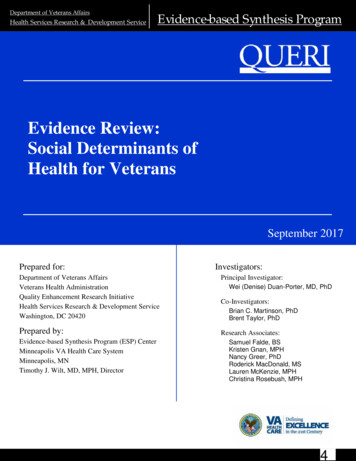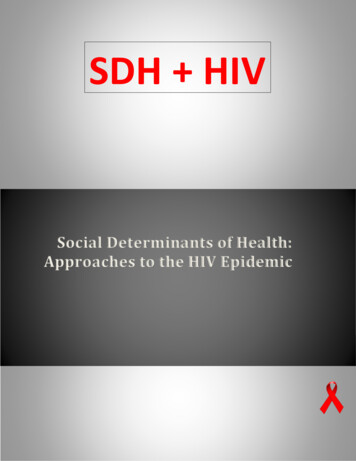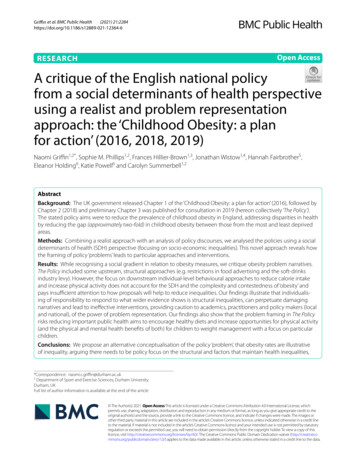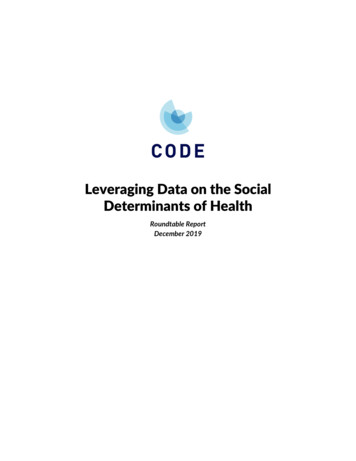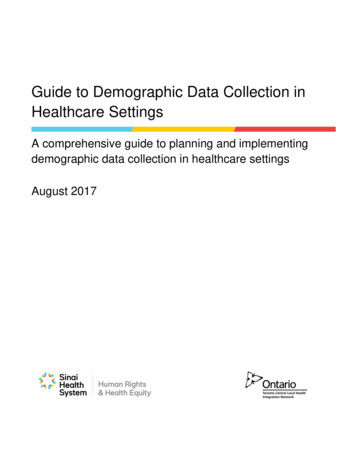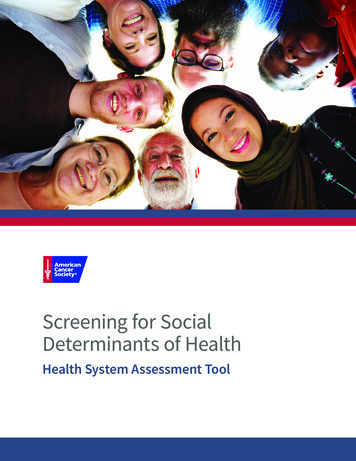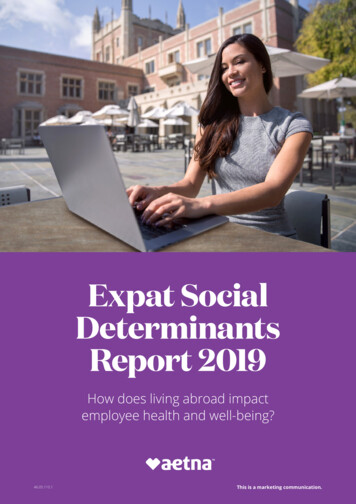
Transcription
Expat SocialDeterminantsReport 2019How does living abroad impactemployee health and well-being?46.05.110.1This is a marketing communication.
Expat Social Determinants Report 2019How does living abroad impactemployee health and well-being?ContentsContentsSummary: why socialdeterminants of health(SDH) matterKey SDH findings 2Introduction: maintaininga healthy, productiveinternational workforceKey SDH findings 3What are the socialdeterminants of health?Key SDH findings 4Key findings:Expat Health and Wellbeing Survey 2019Key SDH findings 5Key SDH findings 1Key SDH findings 6Economic stabilityHealth care systemNeighbourhood andphysical environmentEducationFood and nutritionCommunity and socialcontextConclusionSDH: a priority fora healthier, moresustainable internationalworkforce2
Expat Social Determinants Report 2019How does living abroad impactemployee health and well-being?Summary:why socialdeterminantsof health(SDH) matterHealth care around the world is beingreimagined. Providers, physicians and payersare collaborating in new care ecosystemswhere health outcomes and experiences arethe focus. By understanding people’s experiences, socialdeterminants and health journeys, we can better delivercare, support and value to those we serve.This report focuses on the social determinants of health.It uses data from our recent International WorkerWell-being Survey 2019 of 2,000 expats of working ageto examine how social determinants vary and impactthose living abroad, compared with the influences ontheir counterparts at home. The report delivers thoughtleading insights from Aetna International doctors andexperts to help organisations stay competitive and makethe best decisions for the people in their care.But what are social determinants? How does relocatingoverseas impact the mental and physical well-being ofindividuals and their families? And what can employers dowith this information to help ensure the health, happinessand productivity of their international employees?This report answers these questions and provides expertinsight for organisations with international employees.3By understanding people’sexperiences, socialdeterminants and healthjourneys, we can betterdeliver care, support andvalue to those we serve
Expat Social Determinants Report 2019How does living abroad impactemployee health and well-being?IntroductionIntroduction:Understanding expats –Maintaining a healthy,productive internationalworkforceEvery corner of the world is being made moreaccessible by the relentless rise of technology.However, whilst many organisations nowoperate on a global platform, technologycannot always offer the same commercial benefits aslocal knowledge and personal relationships. As a result,we continue to see a rise in global mobility, as businessesput their own employees on the ground, in geographiesaround the world.At Aetna International we are privileged to join many ofthese people on their global journeys, supporting theirhealth – and that of their families – as they settle intolife in different cultures. We firmly believe that healthy,happy employees, with healthy, happy families, are criticalto the success of any overseas assignment.So, what does it take to maintain a healthyworkforce? We believe that healthcare is personal – every individualhas a unique health history, personalcircumstances and health goals.Whilst health histories, vital signs andlab results can offer a snapshot ofan individual’s health, it is vital thatpersonal circumstances are notoverlooked – often referred toas ‘social determinants of health’(SDH). This might include wherean individual lives and works,what socio-economic factorsimpact them and which lifestylechoices they have made.In fact, only 10 percentof a person’s health isinfluenced by the care heor she receives; geneticsinfluence around 7 percent,4while the remaining 83 percent is influenced by socioeconomic influences and behaviours. (We explore thistopic in our white paper Bespoke health promotion:How personalisation is transforming health.) To reallyimprove people’s health, and to help them become moreproductive members of an international community orworkforce, we must develop a greater understanding ofthe social determinants of health.And, social determinants can vary drastically betweendomestic workers and expats. Leaving home andrelocating internationally creates a unique set of social,professional, cultural and mental health pressures, andit is these expat social determinants that we explore inthis report.At Aetna International, we are very pleased to work handin-hand with organisations to ensure that globally mobileemployees and their families receive the best possiblehealth and wellness support. As we understand moreand more about the factors affecting health care, we cancustomise the support that every individual receives, andin turn, we can help employers maintain a happy, healthyand productive workforce, wherever they are in the world.Richard di BenedettoPresidentAetna International
Expat Social Determinants Report 2019How does living abroad impactemployee health and well-being?What are the social determinants of health?What arethe socialdeterminantsof health?From the moment we’re born, we’re influencedby our unique circumstances, and the influencescontinue as we grow, work and eventuallydie. These circumstances – called ‘the socialdeterminants of health’ – include a range of economic,environmental and community factors. Some of thesewe can control (e.g., whether we use tobacco), and somewe can’t (e.g., whether the local health care system isadequate). Social determinants are increasingly beingused to inform and guide health, well-being and healthcare decisions. For employers, they affect not just thehealth of employees and their families, but also theviability of organisations as a whole.But what are the social determinants, and why are theyimportant to employers with expat workers? Regardlessof setting, the social determinants fall into six broadcategories: economic stability, neighbourhood andphysical environment, education, food and nutrition,community and social context, and the health caresystem. But the specific factors in each category varygreatly between domestic and international settings.5Consider employment, a factor in economic stability.Broadly speaking, a greater continuum of employmentconditions exists in a domestic environment, rangingfrom job precariousness to secure employment.International assignees and globally mobile workersgenerally fall into the upper end of this continuum:the gold standard of a secure, full-time, year-round,well-compensated and socially protected employmentcontract.
Expat Social Determinants Report 2019How does living abroad impactemployee health and well-being?What are the social determinants of health?Yet there are a host of other determinants at work.International workers who enjoy secure, wellcompensated employment may also suffer from socialisolation abroad due to language barriers and unfamiliarcultural norms. So social integration could become amore significant factor for these workers.As an industry, little has been done to document theseinfluences, which is why this report is so important. Toensure they’re nurturing resilient, productive employeesand workforces, employers need to understand thedistinction between the social determinants, as detailedin figures 1 and 2 below. Only then can they find thesolutions to assignment failure and benefit from havinga more loyal, happy, healthy, resilient and productiveworkforce.Figure 1. The social determinants of health in a domestic (or national) settingEconomicstabilityNeighbourhoodand physicalenvironmentEducationFoodCommunity andsocial contextHealth caresystemEmploymentHousingLiteracyHungerSocial integrationHealth coverageIncomeTransportationLanguageSupport Early childhoodeducationAccess to healthyoptionsMedical tyHigher educationCommunityengagementQuality of careDiscriminationStressGeography/locationFigure 2. The key social determinants of health for expatriate employeesEconomicstabilityNeighbourhoodand physicalenvironmentEducationFoodCommunity andsocial contextHealth caresystemEmploymentHousingLanguageQuality of foodSocial integrationHealth coverageIncomeTransportationQuality of careSafetyAccess to healthyoptionsSupport systemsCorporate cultureQuality ofeducationCommunityengagementAccess to careJob e6Nutrition and ity,linguisticand culturalcompetency
Expat Social Determinants Report 2019How does living abroad impactemployee health and well-being?Key findings: Expat Health and Well-being Survey 2019Key findings:Expat Healthand Well-beingSurvey 2019The remainder of this report explores the widerange of findings in our recent survey. Herewe highlight four key findings of significantimmediate benefit to employers1. Workand money28%of our respondents said that wagelevels had a positive impact on theirwell-being after their move. Otheraspects of employment, however,were more detrimental.21%For example,of respondentssaid that the newcorporate culturehad reduced their well-being. Thecorporate culture of an organisationor regional office can play a significantrole in workforce well-being andproductivity; for example, flexibleworking and good work/life balancecan impact well-being positively.7Insights: Employers have the opportunity to adapt theirculture to respond to the needs of the modern workforceto ensure the healthiest, most productive employees.The availability of some flexibility in the working day,encouraging a work/life balance and fostering a cultureof diversity and inclusion are likely to resonate and morepositively influence well-being than a focus on wage levels,as expat assignments tend to fall into the ‘gold standard’ ofemployment conditions.
Expat Social Determinants Report 2019How does living abroad impactemployee health and well-being?Key findings: Expat Health and Well-being Survey 20192. Healthand fitness82%of respondentseither feel that theyshould keep fit andhealthy to improve their well-being, oractively make an effort to keep fit andhealthy most of the time.Insights: Employers have an interested, willing audience whenit comes to introducing wellness initiatives and promotinghealthier habits. They can capitalise on this enthusiasm tosuccessfully embed health and wellness into the corporateculture. Expats, by and large, have a vested interest in ensuringtheir overseas assignment or relocation is a success, and it’sbecoming more widely accepted that there’s a strong linkbetween mental and physical wellness and performance atwork. While it’s largely incumbent on individuals to adopt healthybehaviours, encouragement from employers can help people tofeel empowered and supported to make better choices.3. Settling in46%of respondentssaid it took themup to six monthsto do things like try the local cuisine.41%took up to sixmonths to feelpart of a localcommunity. Our data also showsthat expats who have been abroadfor between two and five years areless likely to have achieved thesefirst experiences at all than thosewhose tenure is under two years.(The fact that employees with ashorter expat tenure are more likelyto have achieved expat firsts couldpoint to the fact that the benefits of‘living like a local’ on well-being hasbecome more widely recognised inrecent years.)8Insights: The sooner employers can help workers feel part of acommunity and achieve ‘firsts’ the better. From experiencing alocal dish to making their first expat or local friend, the quickerthese experiences happen, the greater the chance of an employeefeeling a sense of belonging in their host country, finding a sense ofnormality and experiencing greater well-being in the long run. As anindustry, we’ve started having the conversation about the chancesof assignment success increasing the sooner people accept andadapt to local cultures and norms, but more can be done to putthis wisdom into practice within organisations. Expats are moresensitised and prone to anxiety and stress by virtue of being awayfrom their traditional support networks of friends and family backhome. The employer has the potential to step in to help fill this void.
Expat Social Determinants Report 2019How does living abroad impactemployee health and well-being?Key findings: Expat Health and Well-being Survey 20194. Healthcare tech78%Insights: Enthusiasm for virtual health tech is significant andgrowing. The technology is particularly useful for expats wholive far from quality care facilities and/or have demanding jobs,as it allows them to access primary care and manage chronicconditions remotely. This is a convenient, time-saving benefitfor international assignees and their families. It can also helpemployers contain costs by helping employees keep well or getthem back on their feet if they are ill. Across a population, thebenefits of preventative medicine and access to quality care canhelp to reduce the health-related risks workers face.Read on to discover other insightsinto how understanding expat socialdeterminants of health can help inspirechange at the organisational level andcreate more resilient, healthy, happy,productive workforces around the world.9of respondentsindicated that theyare quite likely toextremely likely to use virtual (remoteaccess) health care technology andservices to access health care tomaintain overall well-being. Those inthe 30-49 age bracket are particularlyreceptive to the concept of usingvirtual care to keep themselves andtheir family well overseas, as werethose with children under 18. Thedata also suggests that the youngerage groups are more likely to be verypositive to virtual health, the olderage groups more likely to bebroadly positive.28%This marks a rise ofin the number of people likely touse a virtual care service since ourPioneering Change survey in 2016,showing that attitudes to virtualhealth are changing – acceptance,even enthusiasm, is growing.
Key SDH findingsEconomicstabilityEmploymentIncomeCorporate cultureJob pressureAspects of economic stability are an importantand powerful driver of health and well-being.It is not hard to see how money troublessuch as debt or unemployment mightimpact mental health – or even physical health if care,treatment and/or medications are interrupted. Evenstress relating to job security can have a negative effect.Taken together, these problems can have a knock-oneffect on productivity as individuals become distractedor preoccupied at work (‘presenteeism’) or miss workfrequently or for long periods of time.These stressors can be amplified by internationalrelocation and living outside one’s country of origin, awayfrom traditional support networks of friends and family.Expats are often stepping into the unknown, with cost ofliving, changing household bills and a potentially differenthealth care system all weighing heavily. The high rate ofinternational assignment failure is testament to this.10
Expat Social Determinants Report 2019How does living abroad impactemployee health and well-being?Economic stability59%The dataWe asked our respondents about theimpact of various aspects of working ina new country. Here is what they said:56% 50%said new ways ofworking were achallenge, with 23percent of thesesaying it had asignificant impact ontheir overall well-beingsaid their new jobwas a challenge, with19 percent sayingit had a significantimpact on theiroverall well-being21%said corporate culturenegatively impactedtheir well-beingOther factors, including working practices,discrimination, HR support, and employeerights, all impacted well-being more negativelythan positively.1128%said the new language wasa challenge, although only 9percent of these said it hadan impact on their well-beingsaid their new salaryimproved their well-beingExpert insightMoneyDr Stella George, Senior Medical Director, AetnaInternational, says, “Whatever impacts the local economyof the country in which an expat lives will ultimatelyimpact that individual in some way”.Where the cost of living is much lower, many peoplesuddenly have access to household help that theydidn’t have before, such as drivers and nannies. As DrLori Stetz, Senior Medical Director, Aetna Internationalexplains, ‘It can make life run more smoothly’.“The cost of living can often surprise people,” says DrMitesh Patel, Medical Director, Aetna International. “Forexample, if you’re from the U.S., and you’re off to Angola,you might initially think, “I can take a fantastic salaryand have a great standard of living there. But Angolais phenomenally expensive for expats. A gallon of milkmight cost you USD10. The cost of an apartment for anexpat might cost a lot more than it does for a local”. Headds that employers should at a bare minimum offer abasic fact sheet to their international workers.
Expat Social Determinants Report 2019How does living abroad impactemployee health and well-being?Economic stabilityWhen you move abroad, everythingbecomes unscripted. Expats may notknow how tax differences and otherfactors may impact their incomeDr George describes meeting a staff member from anot-for-profit who explained that people often think ofexpats on assignment as being better off than locals.“She pointed out that there are some assignments whereconditions are very tough for expats,” says Dr George.“Even getting their next meal or determining where they’llbe sleeping might be through an arrangement with alocal family. Accommodation might be a sofa in a host’shouse”PressureDr Stella George explains that, on a micro level, anindividual can feel intense pressure from earning apromotion and/or performing for a boss and family tomaintain their job and lifestyle. This pressure compoundsother challenges.“In spite of these challenges, the individual has to keepthe job going, no matter what might be going on in theirpersonal life”, she says. “This can be even worse for thosewith health conditions”.Certain career pressures can mean that health and familyoften come second.12The unknownRelocation can involve many unknowns and,consequently, much unpredictability. “Most people knowwhat to expect next year – for example, rent, childcare,household expenses,” explains Dr Lori Stetz. “But, whenyou move abroad, everything becomes unscripted”.Expats may not know how tax differences and otherfactors may impact their income, and this can skew costof living and lifestyle. “And,” she continues, “if the movedoesn’t work out and you have to go home, will your jobstill be there?”The unknown is a stressor, and the consequences ofunknowns can also be a stressor.The role of employerEmployers can benefit from providing education fortheir employees, whether outsourced or in-house. “It’simportant to set employees off on the right foot”, saysDr Lori Stetz. After the move, there is also an ongoingemployer role with support and guidance. This helpsinternational employees build and maintain healthy andhappy lifestyles, which, adds Dr Lori Stetz, “can help maketheir assignment a success”.
Expat Social Determinants Report 2019How does living abroad impactemployee health and well-being?Economic stabilityEconomic stability:Advice for employersWhile money has the power to boost people’s well-being,money worries – such as debt – have the power to drivestress. Understanding the impact of finances on employees’well-being can help employers manage that impact withappropriate support. Employers can adapt their on-boardingand foreign assignment processes to respond to the needsof the modern workforce to ensure the healthiest, mostproductive employees.123413It is important for employers to check the cost of livingin the new country and provide advice or guidance toemployees on assignment. Even a higher salary mayresult in a lower quality of life in the new country ifthe cost of living there is high, and this can put unduepressure on individuals and families, potentiallyresulting in assignment failure.Comprehensive induction and continued supportfor employees as they settle into their new jobis essential to mitigate the risk of challengesimpacting well-being while fostering a healthy,productive working environment that breedsemployee loyalty and retention. A good onboarding process to explain the corporateculture and integrate individuals is thereforeimportant.Preparing international assignees for culturaldifferences can be more important thanpreparing them for changes in corporate culture.They need to know what to expect, where to turnfor advice and help in a non-medical or medicalcapacity and what they should understandabout the culture into which they are hoping tointegrate. All these aspects form part of a robustpre-trip planning strategy.Related to the above is the fact that it is justas important for the health benefits partneror employer to have a good understanding ofthe cultural beliefs and traits of the employeesthemselves. What’s important to them? How dothey conduct themselves and how do they expectto be treated? What cultural etiquette must thosewho make up their support network appreciateand respect? Having a full appreciation of thecultural identity of an employee can inform thequality and efficacy of the support an employerand health services providers can offer.How we can help:Comprehensive destination informationFrom local culture and business etiquette, tofinding a home, making sure you can access thehealth care support you may need, and muchmore, our Destination Guides help members ontheir way.Cultural reports and assessmentsWe can provide eligible employees withpersonalised city security briefs, countryintelligence reports and cultural guidance on adestination country, including business etiquetteand how to greet associates, and local customs.Work/life balance and ‘life administration’Members have access to confidential counselling,lifestyle coaches, and help finding supportfor everyday work/life balance and life adminsolutions – from financial or legal concerns tohelp finding local childcare providers.To find out more about our services andsupport, contact one of our expert salesconsultants. Customers can liaise withtheir dedicated account manager for moreinformation.
Key SDH findingsNeighbourhoodand nt is a key factor in determining healthand can have a big impact on well-being. Thesafety of a neighbourhood is of primary concernand not only has the power to cause stressbut to cause direct harm, whether through pollution orcrime. Another aspect is access to outdoor spaces andproximity to amenities – especially schools for those withchildren. Climate is also often cited as a driver of mentalwell-being and mood.The challenge for those relocating internationally is tounderstand the nature of specific areas (towns, cities andrural areas in the new country) and how that might affectpersonal safety, amenities, weather and access to healthcare. Failing to assess these factors correctly may leaveexpats and their families living in areas with reduced wellbeing and increased stress, danger or other risks.
Expat Social Determinants Report 2019How does living abroad impactemployee health and well-being?Neighbourhood and physical environmentThe data68%said findingaccommodationwas a challenge, ofthese, 39 percent saidit impacted their wellbeing (both ‘significant’and ‘limited’)10%said climate improved theirwell-being, while 19 percentsaid it had a negative affect82%of expats are not concernedabout civil war, unrest orpolitical upheaval, while 18percent are worried aboutthese threats. Of these, 4percent are very worriedIt is important for expats to taketheir own culture into considerationwhen moving abroadExpert insightSafety, security and cultureOf those whowish they wereliving at home,Of those who areglad they’re livingabroad, onlyare concerned aboutcivil war, unrest orpolitical upheavaleither a lot or a littleare concerned aboutcivil war, unrest orpolitical upheavaleither a lot or a little41%14%Our 2018 Expat Experiences Survey alsogathered advice from expats, a common themebeing that they wished they’d known more aboutthe local area.15Various countries can offer very different environmentsfor expats. Dr Mitesh Patel describes the example ofmoving to Saudi Arabia, where many expats live incompounds that provide safety and security. “In SaudiArabia the rules inside the compound may be lessrestrictive than outside”, he says.Dr Patel adds that Europe can be a completely differentscenario because the expat community structure isdifferent. As such, it is important for expats to take theirown culture into consideration when moving abroad.“This often boils down to security”, he says.Safety and security implications can have a big impacton an expat’s life. For example, Dr Lori Stetz says, “Ifyou’re used to going for a walk outside after dinnerwhere you’re from, suddenly you might not be able todo that anymore”.
Expat Social Determinants Report 2019How does living abroad impactemployee health and well-being?Neighbourhood and physical environmentNeighbourhood and physical environment:Advice for employers12Employers can support employees to ensurethey make the best decisions about where tolive as well as help to organise accommodationby providing advice or even on-the-groundsupport from relevant organisations. As such,employers can mitigate the risk of relocationhaving a significant impact on well-being –which it did for 14 percent of those who foundaccommodation a challenge.Employers should encourage those beingsent on assignment to visit the country beforethey relocate to gauge the climate and howthey might feel living there. They can alsoprovide advice on how to cope with the newclimate, whether that means taking warmerclothing or finding accommodation with airconditioning. Getting a glimpse of how (andhow much) workers may need to adapt theirlifestyles to a new climate, culture and workingenvironment can lessen the culture shockwhen the assignment begins. A visit providesan opportunity for the individual to thinkrealistically about whether the move is reallygoing to work.34An inability to settle children is asignificant threat to assignmentsuccess, so the whole familyshould be a focus for employers –not just the employee. This can includefamily health care plans, schools advice andaccommodation and amenities advice. Creatinga robust relocation guide and offering supportfor employees could save employers time andmoney in the long run.There are number of things employers can doto contain costs and maintain a duty of carefor those on assignment and local hires alike,including understanding how and where theyprefer to seek treatment and building up apicture of the health of the workforce and whichconditions might lead to the need for specialistcare abroad. With this information in hand,employers will be able to build the right mix ofbenefits and manage costs.How we can help:Cultural reports and assessmentsWe can provide eligible employees with personalised city security briefs, country intelligence reports and culturalguidance on a destination country, including business etiquette and how to greet associates, and local customs.Work/life balance and ‘life administration’Members have access to confidential counselling, lifestylecoaches, and help finding support for everyday work/lifebalance and life admin solutions – from financial or legalconcerns to help finding local childcare providers.A smooth transitionPre-trip planning assesses the member’s lifestyle and healthcare requirements and those of eligible family members. Thisensures that immediate needs are met, such as a continuationof medication and treatment, and potential future needs areanticipated. The service also provides:o An understanding of the health care system in the newcountryo Help shipping medicationo Medical support for chronic conditionso Help accessing well-being programmes in the new country16To find out more about our servicesand support, contact one of our expertsales consultants. Customers can liaisewith their dedicated account managerfor more information.
Key SDH findingsEducationLanguageQuality of educationEducation is a social determinant of healthbecause it is a gauge of how much someoneknows about what it means to have a healthylifestyle and how to go about building one.While most people know that junk food is bad for themand that they should exercise, many don’t know how tocreate a balanced diet or how much exercise they need– or smart ways of getting that exercise without gyms ororganised sports.In an expat context, language can play a key role in thequality and level of the health care and well-being advicethat an individual is able to access – from not being ableto book doctor’s appointments to not understandingdiagnoses, medical advice or medication directions. As DrLori Stetz states, “By and large, expats are more educatedthan average, but the challenges in the new country arehigher than average”.As our doctors explain here, education can often clashwith cultural teaching, restrictions, taboos and manners.Another factor is access to education for expat children,which can be a challenge in many locations. Whileinternational schools exist in many global cities, theycan be expensive. In rural areas education in the homelanguage may be limited, as our data suggests.17
Expat Social Determinants Report 2019How does living abroad impactemployee health and well-being?EducationThedata59%said the newlanguage wasa challenge butit did not impactthe well-being ofmany (2 percent‘significantimpact’,and 7 percent‘limited impact’)Expert insightCulture and educationChildren and education“The place of one’s upbringing shapes somuch of their life,” says Dr Stella George.“Whether a
topic in our white paper Bespoke health promotion: How personalisation is transforming health.) To really improve people's health, and to help them become more productive members of an international community or workforce, we must develop a greater understanding of the social determinants of health.
